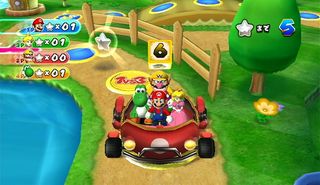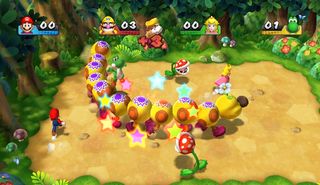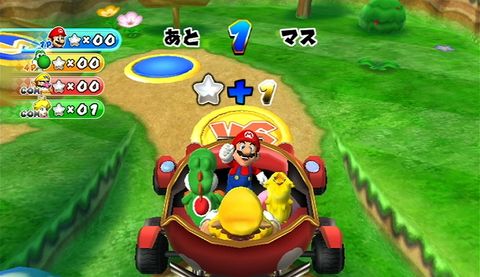GamesRadar+ Verdict
Pros
- +
More balanced than ever
- +
New
- +
addictive minigames
- +
Boss battles a nice touch
Cons
- -
Linear stages get predictable
- -
Some fans may miss random cruelty
- -
Minigames can become infrequent
Why you can trust GamesRadar+
For a good number of gamers, the Mario Party series often elicits two wildly different reactions. Some fondly remember hours spent with friends huddled around a console -- be it a Nintendo 64 or a GameCube -- while wildly spinning an analog stick and harshly teasing one another. Others remember it as an exercise in AI-driven inequality and unfairness, if not as one of the most obnoxiously pervasive franchises in Nintendo's long history that outwore its welcome years ago. The series now returns to a Nintendo platform for the first time in nearly five years and the layoff did it some good, since Mario Party 9 feels like a real rejuvenation for the series.
MP9 was developed by Nd Cube, a Nintendo first-party team containing many members who worked on previous installments. Because of this, all of the core mechanics of the gigantic board game are still in place and have aged wonderfully. You and up to three friends play as a variety of Nintendo stalwarts --Mario, Luigi, Yoshi, and others -- and travel around the board to see who can score the highest in minigames, gain points based on dice rolls, and participate in other diversions. After about an hour you reach the end, at which point a winner is declared. Naturally, taunts and name-calling come part and parcel with the whole ordeal. That's the essence of Mario Party, all the way from 1999's Mario Party to 2007's Wii and DS debuts. And that's here, but Nd Cube's approach to the formula is key.
The leading positive change is to the game board itself, as the circular maps that were reminiscent of classic tabletop games like Monopoly and Trivial Pursuit have been replaced. If it seems minor on paper, it's truly a game-changer with the controller in your hands. Now each stage and playthrough has the group travel down a linear path from start to finish, as turn counts no longer decide the finale. In past games, each player was in a different section of the board, based on their dice rolls. We didn't really notice how disorienting the camera jumps were until we tried MP9's new system, in which all four players inhabit the same vehicle and move together as one, with each taking turns driving the rest of the group. These deceptively simple updates to the board improve the pacing and focus of each playthrough immensely.

Because every player has a stake in his or her opponents' dice rolls, the tensions are higher, and everyone must keep a close eye on the action, whether they're driving or not. That focus is further enhanced thanks to once-per-stage events, including fairly dramatic boss battles, which turn the competitive nature of Mario Party's minigames from cutthroat aggression to passive-aggressive co-op. All players must work together to defeat the powerful boss, but you want to be the one that does the most damage and strikes the final blow, since there's a finishing bonus.
The boss battles are also another example of the increased importance of skill to a series that was notorious for its random results. The new set of minigames are clever enough and, unlike our previous encounters with the series, MP9 rewards performance instead of freak accidents. That’s not to say lucky moments didn’t happen and there were a few minigames built around guessing instead of precision, but it happened much less than we remember from the older games. There's a sense of justice to the action.

MP9 totally revamps the star-driven economy and has an even stronger impact on the overall sense of fairness. No longer are you competing over a handful of stars, with painfully close wins. Instead you collect Mini Stars, a commodity that can be found by the dozens across the game board. Scores have now shifted from hockey-like scores of 3-2 and are more in line with the higher scores of an NFL game.
This new balance and focus has definitely renewed the series, but it comes at some cost. Too much control over the proceedings marks a real departure from the traditional chaos, which will ruffle some feathers. We sympathize, but we still had tons of fun screwing over our competitors, leaving them with the short fuse of a bomb or left with no choice but to land on a destructive Bowser space. Maybe it didn’t happen every turn, but dull moments were rare.
Mario Party 9 remains true to its roots, even with some dramatic (and sorely needed) changes to the traditional board game formula. It's not going to convert you if you aren't into party games. But if you lost interest some time around the umpteenth GameCube iteration, or the woeful Mario Party 8, MP9 is a good excuse to come back. Enough of the old concerns have been addressed and the game is more focused than ever, marking a return to simplicity that reminds us why we loved huddling around those old Nintendo consoles in the first place.
More info
| Genre | Other Games/Compilations |
| Description | The king of party games is back with a more focused approach to the game that paid off. |
| Franchise name | Mario |
| UK franchise name | Mario |
| Platform | "Wii" |
| US censor rating | "Everyone" |
| UK censor rating | "" |
| Release date | 1 January 1970 (US), 1 January 1970 (UK) |
Henry Gilbert is a former GamesRadar+ Editor, having spent seven years at the site helping to navigate our readers through the PS3 and Xbox 360 generation. Henry is now following another passion of his besides video games, working as the producer and podcast cohost of the popular Talking Simpsons and What a Cartoon podcasts.


